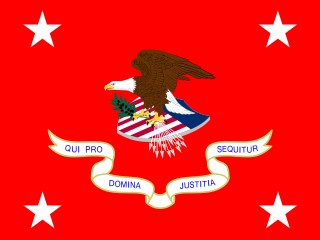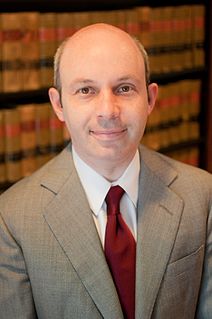
The solicitor general of the United States is the fourth-highest-ranking official in the United States Department of Justice. The current acting solicitor general, Elizabeth Prelogar, has been serving in the role since January 20, 2021.

Thomas Che Goldstein, known as simply Tom Goldstein, is an American lawyer known for his advocacy before and blogging about the Supreme Court of the United States. He was a founding partner of Goldstein and Howe, a Washington, D.C., firm specializing in Supreme Court litigation, and was, until the end of 2010, a partner at Akin Gump, where he was co-head of the litigation and Supreme Court practices. In 2003, he co-founded SCOTUSblog, the most widely read blog covering the Supreme Court, and remains the publisher and occasional contributor, providing analyses and summaries of Supreme Court decisions and cert petitions. He has taught Supreme Court Litigation at Harvard Law School since 2004, and at Stanford Law School from 2004-2012.
The cert pool is a mechanism by which the Supreme Court of the United States manages the influx of petitions for certiorari ("cert") to the court. It was instituted in 1973, as one of the institutional reforms of Chief Justice Warren E. Burger on the suggestion of Justice Lewis F. Powell Jr.
A Supreme Court Clinic is a law school clinic that provides hands-on legal experience in Supreme Court Litigation to law students. Clinics are usually directed by clinical professors and experienced Supreme Court litigators and typically represent indigent or non-profit clients in the Supreme Court of the United States. Assistance is provided pro bono.
The Center on the Administration of Criminal Law is a think-tank dedicated to the promotion of good government and prosecution practices in criminal matters. Its work has been the subject of a feature story in the Associated Press.
The Native American Rights Fund (NARF) is a non-profit organization that uses existing laws and treaties to ensure that U.S. state governments and the U.S. federal government live up to their legal obligations. NARF also "provides legal representation and technical assistance to Indian tribes, organizations and individuals nationwide."

Golinski v. Office of Personnel Management, 824 F. Supp. 2d 968, was a lawsuit filed in the United States District Court for the Northern District of California. The plaintiff, Karen Golinski, challenged the constitutionality of section 3 of the Defense of Marriage Act (DOMA), which defined, for the purposes of federal law, marriage as being between one man and one woman, and spouse as a husband or wife of the opposite sex.
Sorrell v. IMS Health Inc., 564 U.S. 552 (2011), is a United States Supreme Court case in which the Court held that a Vermont statute that restricted the sale, disclosure, and use of records that revealed the prescribing practices of individual doctors violated the First Amendment.
Fisher v. University of Texas, 570 U.S. 297 (2013), also known as Fisher I, is a United States Supreme Court case concerning the affirmative action admissions policy of the University of Texas at Austin. The Supreme Court voided the lower appellate court's ruling in favor of the University and remanded the case, holding that the lower court had not applied the standard of strict scrutiny, articulated in Grutter v. Bollinger (2003) and Regents of the University of California v. Bakke (1978), to its admissions program. The Court's ruling in Fisher took Grutter and Bakke as given and did not directly revisit the constitutionality of using race as a factor in college admissions.

Cardona v. Shinseki was an appeal brought in the United States Court of Appeals for Veterans Claims (CAVC) of a decision by the Board of Veterans' Appeals upholding the denial of service-connected disability benefits for the dependent wife of a female veteran. The United States Department of Veterans Affairs denied the disability benefits based on the definition of "spouse" as "a person of the opposite sex" under federal statute. On March 11, 2014, the CAVC dismissed the case as moot after the Secretary of Veterans Affairs advised the Court that he would neither defend nor enforce the federal statute. Cardona subsequently received full payment of her spousal benefits, retroactive to her date of application.
In Brenner v. Scott and its companion case, Grimsley v. Scott, a U.S. district court found Florida's constitutional and statutory same-sex marriage bans unconstitutional. On August 21, 2014, the court issued a preliminary injunction that prevents that state from enforcing its bans and then stayed its injunction until stays are lifted in the three same-sex marriage cases then petitioning for a writ of certiorari in the U.S. Supreme Court–Bostic, Bishop, and Kitchen–and for 91 days thereafter. When the district court's preliminary injunction took effect on January 6, 2015, enforcement of Florida's bans on same-sex marriage ended.
Obergefell v. Hodges, 576 U.S. 644 (2015), is a landmark civil rights case in which the Supreme Court of the United States ruled that the fundamental right to marry is guaranteed to same-sex couples by both the Due Process Clause and the Equal Protection Clause of the Fourteenth Amendment to the United States Constitution. The 5–4 ruling requires all fifty states, the District of Columbia, and the Insular Areas to perform and recognize the marriages of same-sex couples on the same terms and conditions as the marriages of opposite-sex couples, with all the accompanying rights and responsibilities.
Los Angeles v. Patel, 576 U.S. 409 (2015), was a United States Supreme Court case in which the Court held that a Los Angeles law, Municipal Code § 41.49, requiring hotel operators to retain records about guests for a ninety-day period is facially unconstitutional under the Fourth Amendment to the United States Constitution because it does not allow for pre-compliance review.
Whole Woman's Health v. Hellerstedt, 579 U.S. ___ (2016), was a landmark decision of the US Supreme Court decided on June 27, 2016. The Court ruled 5–3 that Texas cannot place restrictions on the delivery of abortion services that create an undue burden for women seeking an abortion. On June 28, 2016, the Supreme Court refused to hear challenges from Wisconsin and Mississippi where federal appeals courts had struck down similar laws. Other states with similar laws may also be impacted.
Fisher v. University of Texas, 579 U.S. ___ (2016) is a United States Supreme Court case which held that the Court of Appeals for the Fifth Circuit correctly found that the University of Texas at Austin's undergraduate admissions policy survived strict scrutiny, in accordance with Fisher v. University of Texas (2013), which ruled that strict scrutiny should be applied to determine the constitutionality of the University's race-sensitive admissions policy.
Heffernan v. City of Paterson, 578 U.S. ___ (2016), was a United States Supreme Court case in 2016 concerning the First Amendment rights of public employees. By a 6–2 margin, the Court held that a public employee's constitutional rights might be violated when an employer, believing that the employee was engaging in what would be protected speech, disciplines them because of that belief, even if the employee did not exercise such a constitutional right.
Frank v. Gaos, 586 U.S. ___ (2019), was a per curiam decision by the Supreme Court of the United States in a case concerning the practice of cy pres settlements in class action lawsuits. Following oral argument, the court asked the parties to submit supplemental briefs addressing whether the parties had Article III standing to pursue the case in federal courts. Supplemental briefing was completed on December 21, 2018. On March 20, 2019, the court remanded the case to the Ninth Circuit to address the plaintiffs’ standing in light of Spokeo, Inc. v. Robins.
Sharp v. Murphy, 591 U.S. ___ (2020), was a Supreme Court of the United States case of whether Congress disestablished the Muscogee (Creek) Nation reservation. After holding the case from the 2018 term, the case was decided on July 9, 2020, in a per curiam decision following McGirt v. Oklahoma that, for the purposes of the Major Crimes Act, the reservations were never disestablished and remain Native American country.
Franchise Tax Board of California v. Hyatt, 587 U.S. ___ (2019), was a United States Supreme Court case that determined that unless they consent, states have sovereign immunity from private suits filed against them in the courts of another state. The 5–4 decision overturned precedent set in a 1979 Supreme Court case, Nevada v. Hall. This was the third time that the litigants had presented their case to the Court, as the Court had already ruled on the issue in 2003 and 2016.
Department of Homeland Security v. Thuraissigiam, 591 U.S. ___ (2020), was a United States Supreme Court case involving whether the Illegal Immigration Reform and Immigrant Responsibility Act of 1996, which limits habeas corpus judicial review of the decisions of immigration officers, violates the Suspension Clause of Article One of the U.S. Constitution. In the 7–2 opinion, the Court ruled that the law does not violate the Suspension Clause.



